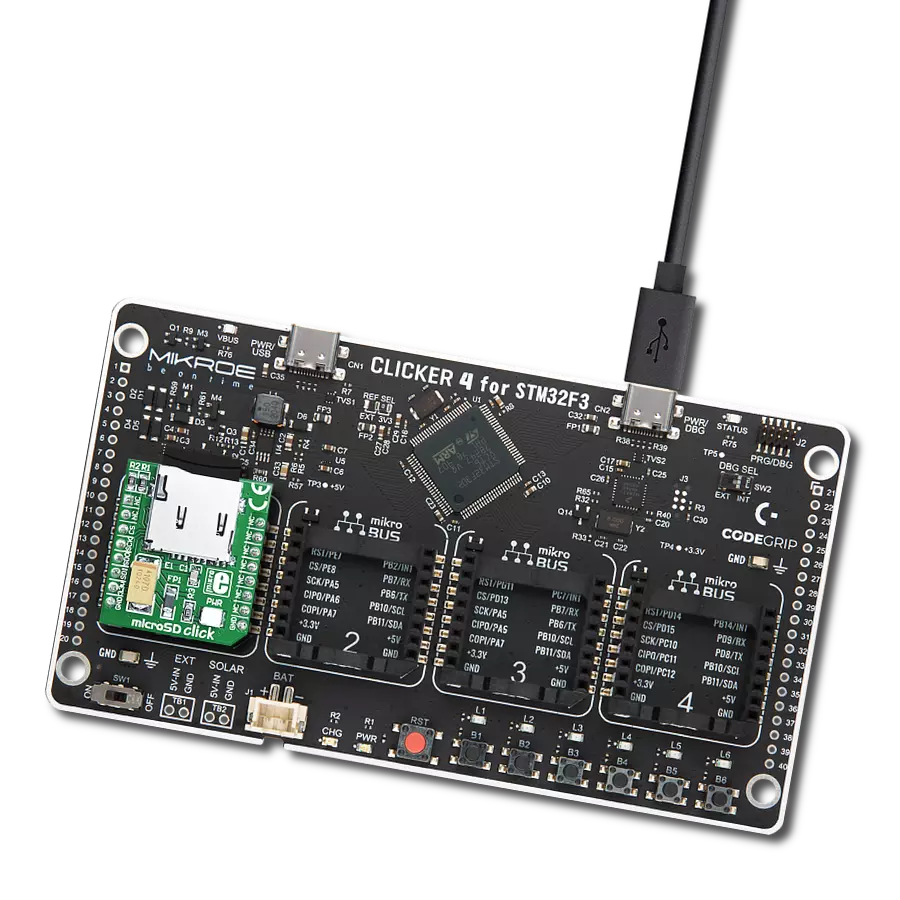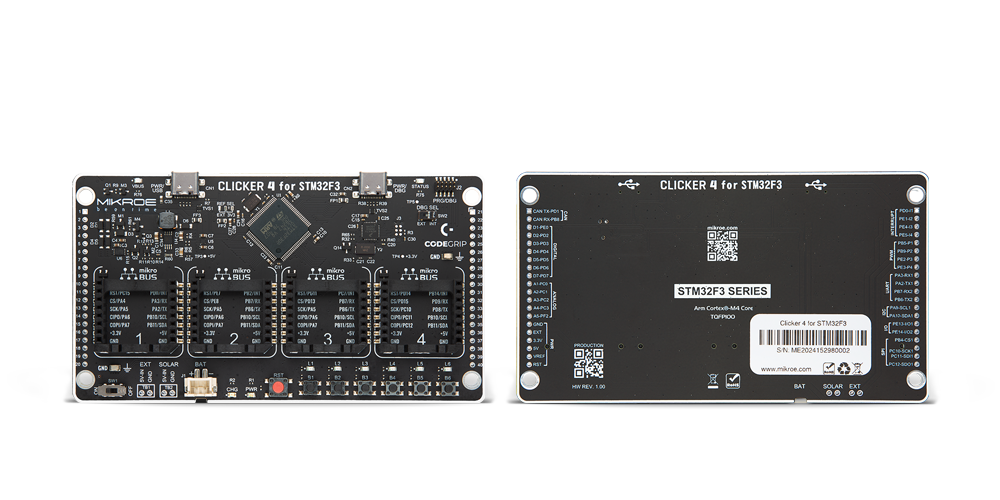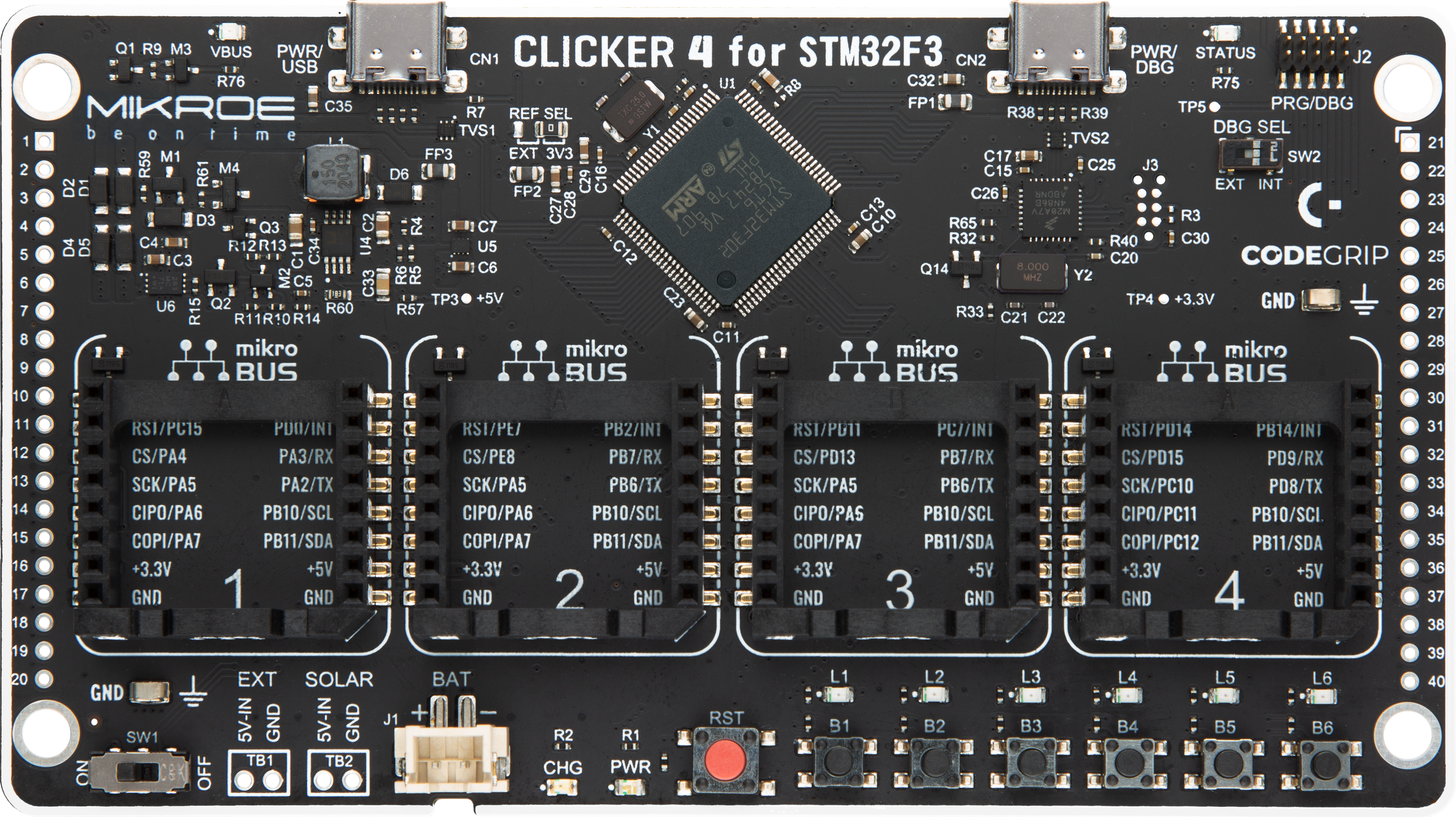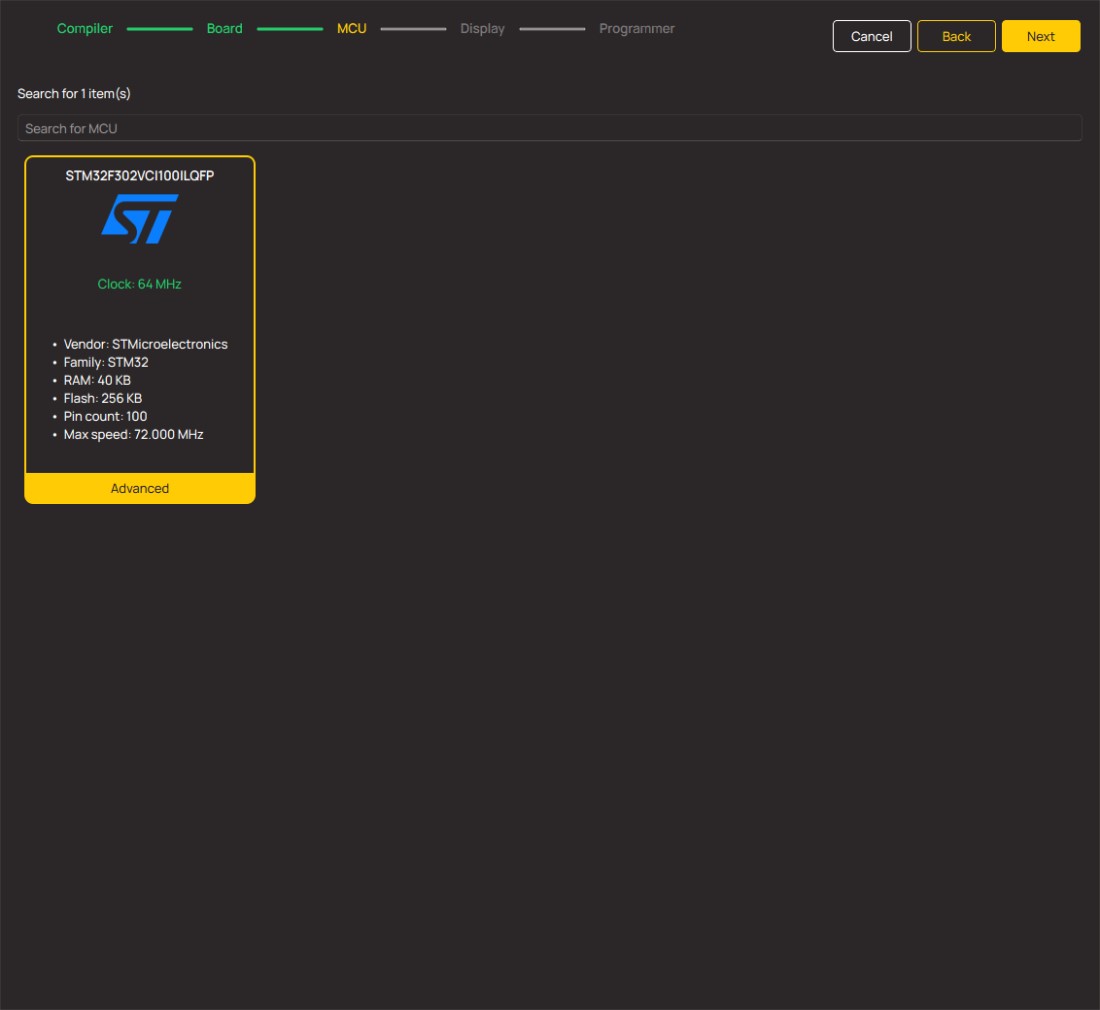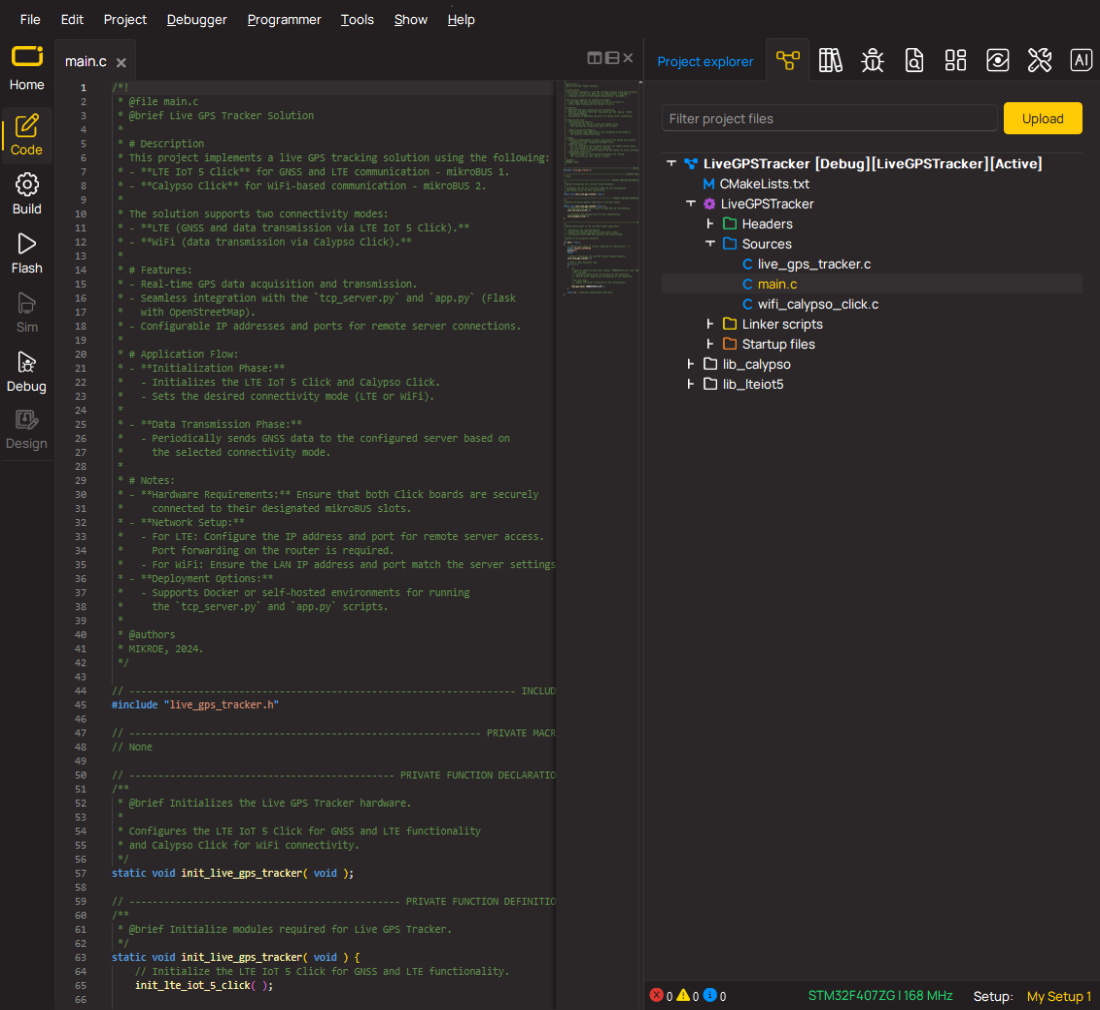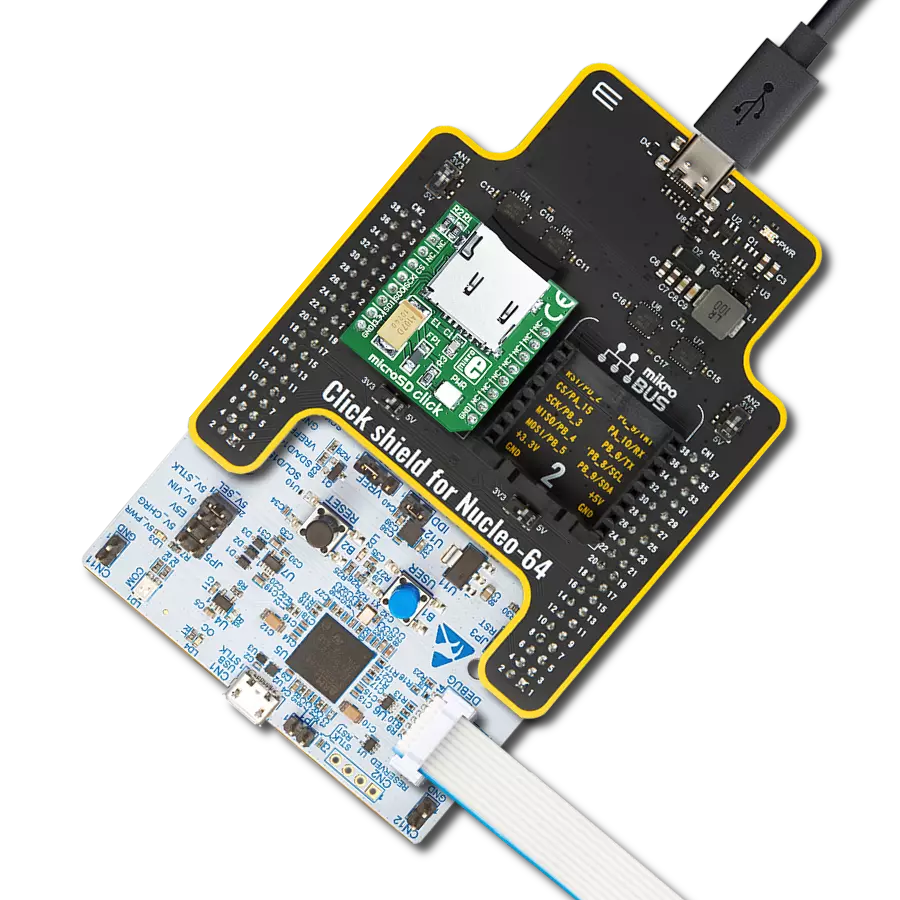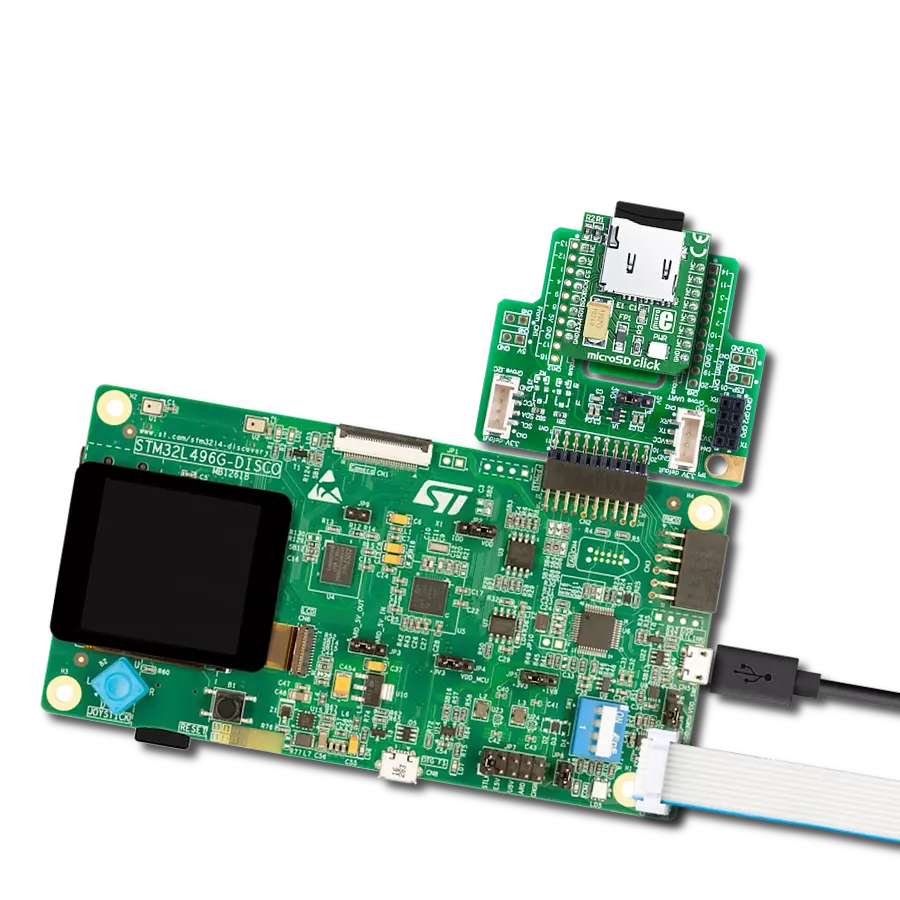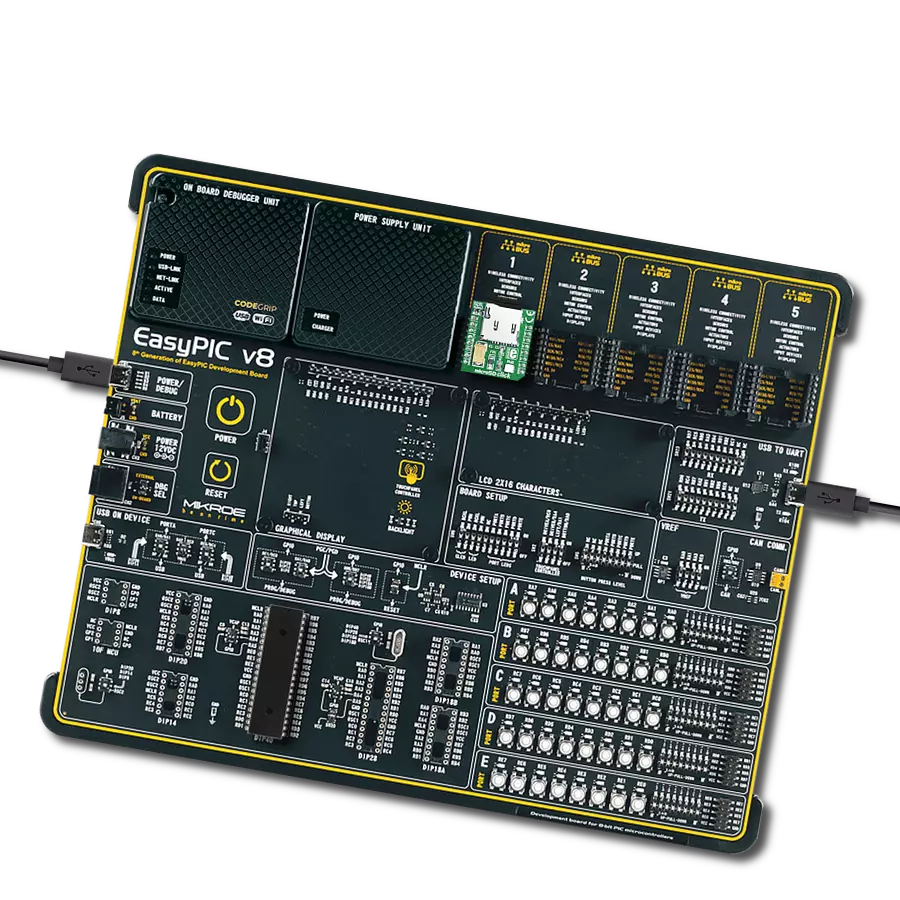Experience the freedom of limitless data storage and boost your project's storage capacity for all multimedia needs
A
A
Hardware Overview
How does it work?
microSD Click is based on the microSD card slot for microSD cards used as a mass storage media for portable devices. The microSD card slot has a push-in ejector, which helps a lot while inserting or removing the microSD card without damaging it. It also helps to hold the microSD card tight in place, thus making all internal connectors safely connected with the microSD card and securing reliable connection and data flow. The power
supply of the microSD card is properly decoupled with capacitors, which eliminates the noise on the microSD Click board and ensures your data is safe on the microSD card. microSD Click and the microSD card use the standard 4-Wire SPI serial interface to communicate with the host MCU. The CS pin is pulled up by default, and the same goes for the card detect pin of the microSD card slot. When the microSD card is inserted, you will get the
logic Low state on the CD pin of the mikroBUS™ socket. This Click board™ can be operated only with a 3.3V logic voltage level. The board must perform appropriate logic voltage level conversion before using MCUs with different logic levels. Also, it comes equipped with a library containing functions and an example code that can be used as a reference for further development.
Features overview
Development board
Clicker 4 for STM32F3 is a compact development board designed as a complete solution, you can use it to quickly build your own gadgets with unique functionalities. Featuring a STM32F302VCT6, four mikroBUS™ sockets for Click boards™ connectivity, power managment, and more, it represents a perfect solution for the rapid development of many different types of applications. At its core, there is a STM32F302VCT6 MCU, a powerful microcontroller by STMicroelectronics, based on the high-
performance Arm® Cortex®-M4 32-bit processor core operating at up to 168 MHz frequency. It provides sufficient processing power for the most demanding tasks, allowing Clicker 4 to adapt to any specific application requirements. Besides two 1x20 pin headers, four improved mikroBUS™ sockets represent the most distinctive connectivity feature, allowing access to a huge base of Click boards™, growing on a daily basis. Each section of Clicker 4 is clearly marked, offering an intuitive and clean interface. This makes working with the development
board much simpler and thus, faster. The usability of Clicker 4 doesn’t end with its ability to accelerate the prototyping and application development stages: it is designed as a complete solution which can be implemented directly into any project, with no additional hardware modifications required. Four mounting holes [4.2mm/0.165”] at all four corners allow simple installation by using mounting screws. For most applications, a nice stylish casing is all that is needed to turn the Clicker 4 development board into a fully functional, custom design.
Microcontroller Overview
MCU Card / MCU
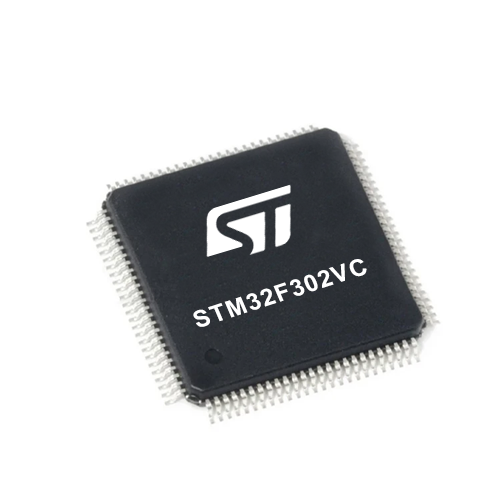
Architecture
ARM Cortex-M4
MCU Memory (KB)
256
Silicon Vendor
STMicroelectronics
Pin count
100
RAM (Bytes)
40960
Used MCU Pins
mikroBUS™ mapper
Take a closer look
Click board™ Schematic

Step by step
Project assembly
Track your results in real time
Application Output
1. Application Output - In Debug mode, the 'Application Output' window enables real-time data monitoring, offering direct insight into execution results. Ensure proper data display by configuring the environment correctly using the provided tutorial.

2. UART Terminal - Use the UART Terminal to monitor data transmission via a USB to UART converter, allowing direct communication between the Click board™ and your development system. Configure the baud rate and other serial settings according to your project's requirements to ensure proper functionality. For step-by-step setup instructions, refer to the provided tutorial.
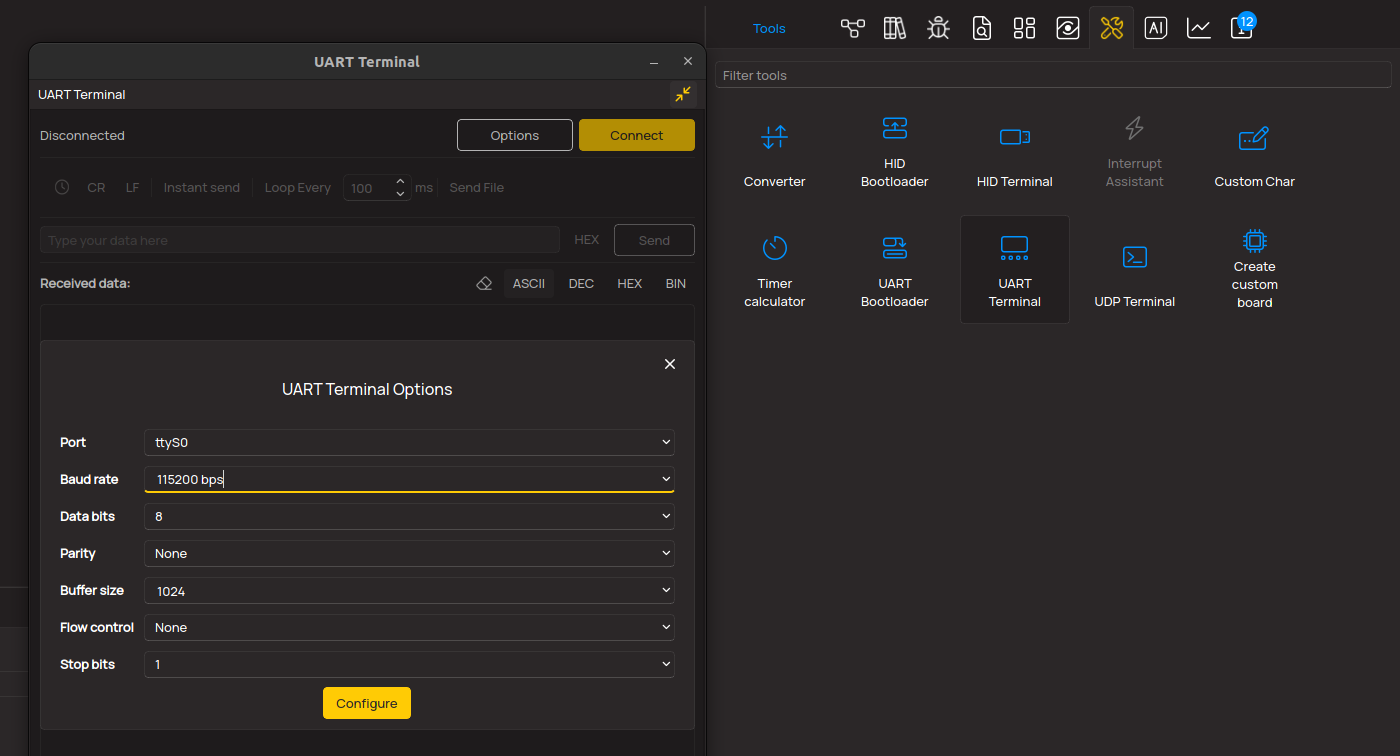
3. Plot Output - The Plot feature offers a powerful way to visualize real-time sensor data, enabling trend analysis, debugging, and comparison of multiple data points. To set it up correctly, follow the provided tutorial, which includes a step-by-step example of using the Plot feature to display Click board™ readings. To use the Plot feature in your code, use the function: plot(*insert_graph_name*, variable_name);. This is a general format, and it is up to the user to replace 'insert_graph_name' with the actual graph name and 'variable_name' with the parameter to be displayed.
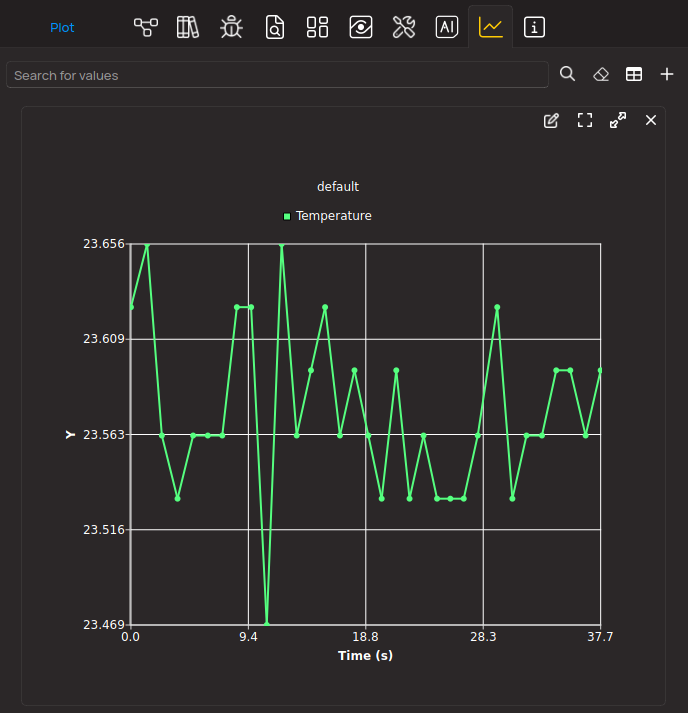
Software Support
Library Description
This library contains API for microSD Click driver.
Key functions:
microsd_check_card_detection- This function checks and waits for a microSD card to be inserted to the Click board™.microsd_create_directory- This function creates a new directory at the selected absolute path. The path should contain a name of the directory to be created.microsd_display_directory- This function reads and displays the content of the directory at the selected path.
Open Source
Code example
The complete application code and a ready-to-use project are available through the NECTO Studio Package Manager for direct installation in the NECTO Studio. The application code can also be found on the MIKROE GitHub account.
/*!
* @file main.c
* @brief microSD Click example
*
* # Description
* This example demonstrates a basic file system functionality and operations with files
* and directories using a microSD Click board.
*
* The demo application is composed of two sections :
*
* ## Application Init
* Initializes the driver and logger and performs a several operations with file system
* that demonstrates the basic usage of microSD Click board.
*
* ## Application Task
* Reads and displays on the USB UART the contents of all directories created
* during application init.
*
* @author Stefan Filipovic
*
*/
#include "board.h"
#include "log.h"
#include "microsd.h"
static microsd_t microsd;
static log_t logger;
// WARNING: If you change the value of below macro to 1 the inserted
// microSD card will be formatted at the beginning.
#define FORMAT_CARD 0
// Files and directories path and names definition
#define PATH_ROOT "3:/"
#define PATH_DIR1 PATH_ROOT "_DIR1_/"
#define PATH_DIR2 PATH_DIR1 "_DIR2_/"
#define PATH_DIR3 PATH_DIR1 "_DIR3_/"
#define PATH_DIR4 PATH_ROOT "_DIR4_/"
#define PATH_DIR5 PATH_DIR1 "_DIR5_/"
#define PATH_FILE1 PATH_ROOT "_FILE1_.TXT"
#define PATH_FILE2 PATH_DIR3 "_FILE2_.CSV"
// Data buffer size used for read/write operations
#define BUFFER_SIZE 256
/**
* @brief microSD check card detection function.
* @details This function checks and waits for a microSD card to be inserted
* to the Click board.
* @param[in] ctx : Click context object.
* See #microsd_t object definition for detailed explanation.
* @return None.
* @note None.
*/
void microsd_check_card_detection ( microsd_t *ctx );
/**
* @brief microSD display directory function.
* @details This function reads and displays the content of the directory
* at the selected path.
* @param[in] dir_path : The absolute path to the directory to be displayed.
* @return None.
* @note None.
*/
void microsd_display_directory ( uint8_t *dir_path );
/**
* @brief microSD create directory function.
* @details This function creates a new directory at the selected absolute path.
* The path should contain a name of the directory to be created.
* @param[in] dir_path : The absolute path to the directory to be created.
* @return None.
* @note None.
*/
void microsd_create_directory ( uint8_t *dir_path );
/**
* @brief microSD remove path function.
* @details This function removes a file or a directory from the selected absolute path.
* @param[in] path : The absolute path to the file or directory to be removed.
* @return None.
* @note None.
*/
void microsd_remove_path ( uint8_t *path );
/**
* @brief microSD rename path function.
* @details This function renames a file or a directory from the selected absolute path
* specified by the @c old_path parameter, to the absolute path specified by the
* @c new_path parameter.
* @param[in] old_path : The old path to the file or directory to be renamed.
* @param[in] new_path : The new path to the file or directory.
* @return None.
* @note None.
*/
void microsd_rename_path ( uint8_t *old_path, uint8_t *new_path );
/**
* @brief microSD create file function.
* @details This function creates a new file at the selected absolute path.
* The path should contain a name of the file to be created.
* @param[in] file_path : The absolute path to the file to be created.
* @return None.
* @note None.
*/
void microsd_create_file ( uint8_t *file_path );
/**
* @brief microSD write to file function.
* @details This function writes a desired number of data bytes to the end of file
* at the selected absolute path.
* @param[in] file_path : The absolute path to the file.
* @param[in] data_in : The data buffer to be written.
* @param[in] data_len : Number of data bytes to be written.
* @return None.
* @note None.
*/
void microsd_write_to_file ( uint8_t *file_path, uint8_t *data_in, uint32_t data_len );
/**
* @brief microSD copy file function.
* @details This function copies the content of a file from the selected absolute path
* specified by the @c src_file_path parameter, to the absolute path specified by the
* @c dst_file_path parameter.
* @param[in] src_file_path : The source file absolute path.
* @param[in] dst_file_path : The destination file absolute path.
* @return None.
* @note None.
*/
void microsd_copy_file ( uint8_t *src_file_path, uint8_t *dst_file_path );
/**
* @brief microSD format drive function.
* @details This function formats the logical drive previously mounted to file system
* with identifying drive number.
* @param[in] path : The ROOT path of drive to be formatted.
* @return None.
* @note None.
*/
void microsd_format_drive ( uint8_t *path );
/**
* @brief microSD mount drive function.
* @details This function mounts the initialized logical drive to the initialized
* physical drive and overall file system.
* @param[in] ctx : Click context object.
* See #microsd_t object definition for detailed explanation.
* @param[in] path : The ROOT path of drive to be mounted.
* @return None.
* @note None.
*/
void microsd_mount_drive ( microsd_t *ctx, uint8_t *path );
/**
* @brief microSD unmount drive function.
* @details This function unmounts the mounted logical drive from the file system.
* @param[in] path : The ROOT path of drive to be unmounted.
* @return None.
* @note None.
*/
void microsd_unmount_drive ( uint8_t *path );
void application_init ( void )
{
log_cfg_t log_cfg; /**< Logger config object. */
microsd_cfg_t microsd_cfg; /**< Click config object. */
/**
* Logger initialization.
* Default baud rate: 115200
* Default log level: LOG_LEVEL_DEBUG
* @note If USB_UART_RX and USB_UART_TX
* are defined as HAL_PIN_NC, you will
* need to define them manually for log to work.
* See @b LOG_MAP_USB_UART macro definition for detailed explanation.
*/
LOG_MAP_USB_UART( log_cfg );
log_init( &logger, &log_cfg );
log_info( &logger, " Application Init " );
// Click initialization.
microsd_cfg_setup( µsd_cfg );
MICROSD_MAP_MIKROBUS( microsd_cfg, MIKROBUS_1 );
if ( MICROSD_ERROR == microsd_init( µsd, µsd_cfg ) )
{
log_error( &logger, " Communication init." );
for ( ; ; );
}
microsd_check_card_detection ( µsd );
Delay_ms ( 1000 );
// Mount the initialized logical drive to the initialized physical drive and overall file system
microsd_mount_drive ( µsd, PATH_ROOT );
#if FORMAT_CARD
// Format the logical drive previously mounted to file system with identifying ROOT drive number
microsd_format_drive ( PATH_ROOT );
#endif
microsd_display_directory ( PATH_ROOT );
Delay_ms ( 1000 );
Delay_ms ( 1000 );
// Create DIR1 directory
microsd_create_directory ( PATH_DIR1 );
Delay_ms ( 500 );
// Create DIR2 directory
microsd_create_directory ( PATH_DIR2 );
Delay_ms ( 500 );
// Create DIR4 directory
microsd_create_directory ( PATH_DIR4 );
Delay_ms ( 500 );
microsd_display_directory ( PATH_ROOT );
Delay_ms ( 1000 );
Delay_ms ( 1000 );
// Remove DIR4 directory
microsd_remove_path ( PATH_DIR4 );
Delay_ms ( 500 );
microsd_display_directory ( PATH_ROOT );
Delay_ms ( 1000 );
Delay_ms ( 1000 );
microsd_display_directory ( PATH_DIR1 );
Delay_ms ( 1000 );
Delay_ms ( 1000 );
// Rename DIR2 to DIR3
microsd_rename_path ( PATH_DIR2, PATH_DIR3 );
Delay_ms ( 500 );
microsd_display_directory ( PATH_DIR1 );
Delay_ms ( 1000 );
Delay_ms ( 1000 );
microsd_display_directory ( PATH_ROOT );
Delay_ms ( 1000 );
Delay_ms ( 1000 );
// Create the FILE1
microsd_create_file ( PATH_FILE1 );
Delay_ms ( 500 );
microsd_display_directory ( PATH_ROOT );
Delay_ms ( 1000 );
Delay_ms ( 1000 );
uint8_t rw_buffer[ BUFFER_SIZE ] = { 0 };
// Populate write buffer with bytes ranging from 0 to 255
for ( uint16_t cnt = 0; cnt < BUFFER_SIZE; cnt++ )
{
rw_buffer[ cnt ] = cnt & 0xFF;
}
microsd_write_to_file ( PATH_FILE1, rw_buffer, BUFFER_SIZE );
Delay_ms ( 500 );
microsd_display_directory ( PATH_ROOT );
Delay_ms ( 1000 );
Delay_ms ( 1000 );
microsd_display_directory ( PATH_DIR3 );
Delay_ms ( 1000 );
Delay_ms ( 1000 );
// Create the FILE2
microsd_create_file ( PATH_FILE2 );
Delay_ms ( 500 );
microsd_display_directory ( PATH_DIR3 );
Delay_ms ( 1000 );
Delay_ms ( 1000 );
// Copy data from FILE1 to FILE2
microsd_copy_file ( PATH_FILE1, PATH_FILE2 );
Delay_ms ( 500 );
microsd_display_directory ( PATH_DIR3 );
Delay_ms ( 1000 );
Delay_ms ( 1000 );
// Create DIR5 directory
microsd_create_directory ( PATH_DIR5 );
Delay_ms ( 500 );
microsd_display_directory ( PATH_DIR1 );
Delay_ms ( 1000 );
Delay_ms ( 1000 );
log_info( &logger, " Application Task " );
}
void application_task ( void )
{
microsd_display_directory ( PATH_ROOT );
Delay_ms ( 1000 );
Delay_ms ( 1000 );
microsd_display_directory ( PATH_DIR1 );
Delay_ms ( 1000 );
Delay_ms ( 1000 );
microsd_display_directory ( PATH_DIR3 );
Delay_ms ( 1000 );
Delay_ms ( 1000 );
microsd_display_directory ( PATH_DIR5 );
Delay_ms ( 1000 );
Delay_ms ( 1000 );
Delay_ms ( 1000 );
Delay_ms ( 1000 );
Delay_ms ( 1000 );
log_printf ( &logger, "\r\n\n" );
}
int main ( void )
{
/* Do not remove this line or clock might not be set correctly. */
#ifdef PREINIT_SUPPORTED
preinit();
#endif
application_init( );
for ( ; ; )
{
application_task( );
}
return 0;
}
void microsd_check_card_detection ( microsd_t *ctx )
{
if ( microsd_get_card_detect ( ctx ) )
{
log_printf ( &logger, " microSD card is not detected.\r\n" );
log_printf ( &logger, " Make sure to insert a card correctly.\r\n" );
log_printf ( &logger, "--------------------------------------\r\n\n" );
while ( microsd_get_card_detect ( ctx ) );
log_printf ( &logger, " microSD card is detected.\r\n" );
log_printf ( &logger, "--------------------------------------\r\n\n" );
}
}
void microsd_display_directory ( uint8_t *dir_path )
{
dir_t dir1;
DIR fatfs_dir_1;
FILINFO info;
log_printf ( &logger, " #### Display directory: %s\r\n", dir_path );
// Open directory and make it ready for reading operation
if ( FSS_OK == dir_open ( &dir1, &fatfs_dir_1, dir_path ) )
{
log_printf ( &logger, " Open directory\r\n" );
log_printf ( &logger, " Content:\r\n" );
// Read directory entries and print their type and name
for ( ; ; )
{
if ( FSS_OK == dir_read( &dir1, &info ) )
{
if ( info.fattrib & AM_DIR )
{
log_printf ( &logger, "\t<DIR>\tname: %s\r\n", info.fname );
}
else
{
log_printf ( &logger, "\t<FILE>\tname: %s size: %lu\r\n", info.fname, info.fsize );
}
}
else
{
break;
}
}
// Close directory
if ( FSS_OK == dir_close ( &dir1 ) )
{
log_printf( &logger, " Close directory\r\n" );
}
}
log_printf ( &logger, "--------------------------------------\r\n\n" );
}
void microsd_create_directory ( uint8_t *dir_path )
{
if ( FSS_OK == file_system_mkdir ( dir_path ) )
{
log_printf ( &logger, " Create directory: %s\r\n", dir_path );
log_printf ( &logger, "--------------------------------------\r\n\n" );
}
}
void microsd_remove_path ( uint8_t *path )
{
if ( FSS_OK == file_system_remove ( path ) )
{
log_printf ( &logger, " Remove path: %s\r\n", path );
log_printf ( &logger, "--------------------------------------\r\n\n" );
}
}
void microsd_rename_path ( uint8_t *old_path, uint8_t *new_path )
{
if ( FSS_OK == file_system_rename ( old_path, new_path ) )
{
log_printf ( &logger, " Rename %s to %s\r\n", old_path, new_path );
log_printf ( &logger, "--------------------------------------\r\n\n" );
}
}
void microsd_create_file ( uint8_t *file_path )
{
file_t file;
FIL fatfs_file;
// Create the file and make it ready for read and write operations
if ( FSS_OK == file_open ( &file, &fatfs_file, file_path,
FS_FILE_CREATE_NEW | FS_FILE_WRITE | FS_FILE_READ ) )
{
log_printf( &logger, " Create and open file: %s\r\n", file_path );
if ( FSS_OK == file_close ( &file ) )
{
log_printf( &logger, " Close file.\r\n" );
}
log_printf ( &logger, "--------------------------------------\r\n\n" );
}
}
void microsd_write_to_file ( uint8_t *file_path, uint8_t *data_in, uint32_t data_len )
{
file_t file;
FIL fatfs_file;
// Open the file and make it ready for read and write operations
if ( FSS_OK == file_open ( &file, &fatfs_file, file_path,
FS_FILE_WRITE | FS_FILE_READ | FS_FILE_OPEN_APPEND ) )
{
log_printf( &logger, " Open file: %s\r\n", file_path );
if ( FSS_OK == file_write ( &file, data_in, data_len ) )
{
log_printf( &logger, " Write data buffer to file\r\n" );
}
if ( FSS_OK == file_sync ( &file ) )
{
log_printf( &logger, " Save file changes\r\n" );
}
if ( FSS_OK == file_close ( &file ) )
{
log_printf( &logger, " Close file.\r\n" );
}
log_printf ( &logger, "--------------------------------------\r\n\n" );
}
}
void microsd_copy_file ( uint8_t *src_file_path, uint8_t *dst_file_path )
{
uint8_t data_read = 0;
file_t file1, file2;
FIL fatfs_file1, fatfs_file2;
// Create or open the file and make it ready for read and write operations
if ( FSS_OK == file_open ( &file1, &fatfs_file1, src_file_path, FS_FILE_WRITE | FS_FILE_READ ) )
{
log_printf( &logger, " Open source file: %s\r\n", src_file_path );
if ( FSS_OK == file_open ( &file2, &fatfs_file2, dst_file_path, FS_FILE_WRITE | FS_FILE_READ ) )
{
log_printf( &logger, " Open destination file: %s\r\n", dst_file_path );
log_printf( &logger, " Copying data from source to destination file...\r\n" );
for ( ; ; )
{
if ( FSS_OK == file_read ( &file1, &data_read, 1 ) )
{
file_write ( &file2, &data_read, 1 );
}
else
{
break;
}
}
if ( FSS_OK == file_close ( &file1 ) )
{
log_printf( &logger, " Close source file.\r\n" );
}
if ( FSS_OK == file_close ( &file2 ) )
{
log_printf( &logger, " Close destination file.\r\n" );
}
}
log_printf ( &logger, "--------------------------------------\r\n\n" );
}
}
void microsd_format_drive ( uint8_t *path )
{
if ( FSS_OK == file_system_format ( path ) )
{
log_printf( &logger, " Format drive: %s\r\n", path );
log_printf ( &logger, "--------------------------------------\r\n\n" );
}
}
void microsd_mount_drive ( microsd_t *ctx, uint8_t *path )
{
if ( FSS_OK == file_system_mount ( &ctx->fat_ldrive.base, path, &ctx->sd_pdrive.base ) )
{
log_printf ( &logger, " Mount drive: %s\r\n", path );
log_printf ( &logger, "--------------------------------------\r\n\n" );
}
}
void microsd_unmount_drive ( uint8_t *path )
{
if ( FSS_OK == file_system_unmount ( path ) )
{
log_printf ( &logger, " Unmount drive: %s\r\n", path );
log_printf ( &logger, "--------------------------------------\r\n\n" );
}
}
// ------------------------------------------------------------------------ END
Additional Support
Resources
Category:microSD
